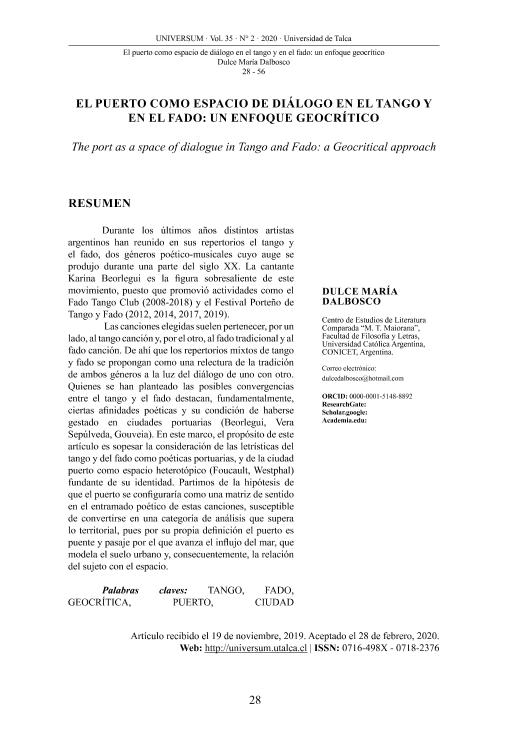Artículo
Durante los últimos años distintos artistas argentinos han reunido en sus repertorios el tango y el fado, dos géneros poético-musicales cuyo auge se produjo durante una parte del siglo XX. La cantante Karina Beorlegui es la figura sobresaliente de este movimiento, puesto que promovió actividades como el Fado Tango Club (2008-2018) y el Festival Porteño de Tango y Fado (2012, 2014, 2017, 2019). Las canciones elegidas suelen pertenecer, por un lado, al tango canción y, por el otro, al fado tradicional y al fado canción. De ahí que los repertorios mixtos de tango y fado se propongan como una relectura de la tradición de ambos géneros a la luz del diálogo de uno con otro. Quienes se han planteado las posibles convergencias entre el tango y el fado destacan, fundamentalmente, ciertas afinidades poéticas y su condición de haberse gestado en ciudades portuarias (Beorlegui, Vera Sepúlveda, Gouveia). En este marco, el propósito de este artículo es sopesar la consideración de las letrísticas del tango y del fado como poéticas portuarias, y de la ciudad puerto como espacio heterotópico (Foucault, Westphal) fundante de su identidad. Partimos de la hipótesis de que el puerto se configuraría como una matriz de sentido en el entramado poético de estas canciones, susceptible de convertirse en una categoría de análisis que supera lo territorial, pues por su propia definición el puerto es puente y pasaje por el que avanza el influjo del mar, que modela el suelo urbano y, consecuentemente, la relación del sujeto con el espacio. In recent years, different Argentinian artists have gathered Tango and Fado in their repertoires, two musical and poetical genres which boom took place during some part of the Twentieth Century. Singer Karina Beorlegui is the outstanding figure of this movement, since she has promoted activities such as the Fado Tango Club (2008-2018) and the Festival Porteño of Tango and Fado (2012, 2014, 2017, 2019). The chosen songs usually belong, on one hand, to the Tango-song period, and, on the other, to the Fados known as traditional Fado and Fado-song. Consequently, the mixed repertoires of Tango and Fado propose a rereading of the tradition of both genres and promote the dialogue between them. Those who have thought about the possible convergences between Tango and Fado have highlighted, fundamentally, certain poetic affinities and their condition of having been developed in port cities (Beorlegui, Vera Sepúlveda, Gouveia). In this context, the purpose of this article is to consider the lyrics of Tango and Fado as Port Poetics, and the port city as a heterotopia (Foucault, Westphal) in which its identity is based. Our starting point is the hypothesis that the port could be conceived as a matrix of meaning in the poetic structure of these songs. In fact, the port city could become a category of analysis that exceeds its territorial aspect, because by definition the port is a bridge and a passage through which the influence of the sea advances, models the urban land and, consequently, the relationship of the individual with space.
El puerto como espacio de diálogo en el tango y en el fado: un enfoque geocrítico
Título:
The port as a space of dialogue in Tango and Fado: a geocritical approach
Fecha de publicación:
12/2020
Editorial:
Universidad de Talca
Revista:
Universum
ISSN:
0716-498X
e-ISSN:
0718-2376
Idioma:
Español
Tipo de recurso:
Artículo publicado
Clasificación temática:
Resumen
Palabras clave:
TANGO
,
FADO
,
GEOCRÍTICA
,
PUERTO
,
CIUDAD
Archivos asociados
Licencia
Identificadores
Colecciones
Articulos(SEDE CENTRAL)
Articulos de SEDE CENTRAL
Articulos de SEDE CENTRAL
Citación
Dalbosco, Dulce María; El puerto como espacio de diálogo en el tango y en el fado: un enfoque geocrítico; Universidad de Talca; Universum; 35; 2; 12-2020; 28-56
Compartir
Altmétricas




